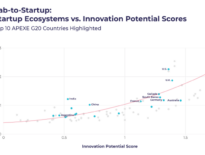
Public policy isn’t just a framework for startups and investors, it’s a gatekeeper deciding who gets to play the game. And few policies are as restrictive as the Securities and Exchange Commission’s (SEC) definition of an “accredited investor.” This definition has long determined who can and cannot invest in private securities offerings (i.e. startups), not based on financial literacy, experience, or sophistication, but rather on wealth thresholds set decades ago.
The SEC’s framework for accredited investors is outdated, in a manner that contributes to assertions of discrimination, and actively harming the ability of startups to access early-stage capital. The 2025 Trump administration is clearing taking different approaches to financial regulations, but the real power to fix this issue lies with Congress.
Article Highlights
What Is an Accredited Investor and Why Does It Matter?
An individual who meets one of the following financial criteria is considered accredited:
- Income: An individual must have earned at least $200,000 per year ($300,000 if combined with a spouse or spousal equivalent) in the previous two years, with the expectation of maintaining that level.
- Net Worth: Alternatively, an individual must have a net worth of at least $1 million, excluding the value of their primary residence.
These thresholds, established in the early 1980s, were designed to protect investors from financial ruin due to risky, illiquid investments – which, let’s be absolutely clear, investing in startups is exceptionally high risk, and most people should NOT. The mistake underlying that threshold though is that wealth equates to financial sophistication or understanding of startups – and let’s also be crystal clear, that’s just b.s. The implication: A fundamentally flawed system that limits investment opportunities to a small, likely inexperienced or actually unqualified class of individuals, disproportionately excluding minorities, rural investors, and those without generational wealth.
For decades, these financial thresholds have remained unchanged, despite inflation and the rapid expansion of financial literacy tools. If indexed for inflation, today’s accredited investor requirements would be closer to $3.5 million in net worth and $700,000 in annual income. Meanwhile, countless capable investors remain locked out, unable to support entrepreneurs and contribute to the startups that drive our economy.
The Impact of Restrictive Investment Rules on the U.S. Economy
Startups and small businesses are the backbone of the American economy. With over 35 million small businesses employing nearly 46% of the private-sector workforce, and startups the source of most job creation, early-stage capital is an essential economic engine (best left to the private sector and investors). However, a lack of investor diversity and access to funding networks remains one of the biggest barriers to capital for these businesses.
- Fewer than 19% of U.S. households qualify as accredited investors, meaning the vast majority of Americans are legally barred from funding startups.
- Only 1.3% of angel investors are Black, and 2.3% are Hispanic.
- Just 1.7% of VC-backed startups have a Black founder, and 1.3% have a Latino founder.
By restricting who can invest, the SEC is artificially suppressing the flow of capital that could be fueling new businesses, technological breakthroughs, and job creation. These regulations aren’t protecting investors — they’re harming economic growth and, frankly, restricting individual rights.
What’s worse? The SEC has been considering raising the financial thresholds, further reducing the number of people who qualify to invest. If enacted, this would mean fewer investors, fewer startups getting funded, and even greater economic inequality.
Since so Risky, should we Expand Investment Access for All??
The argument for reform is straightforward:
- Financial education and experience, not wealth, should determine investment eligibility. Wealth is not a proxy for sophistication. Millions of professionals — accountants, financial advisors, startup operators, startup development organization leaders, economists, and business owners — possess the expertise to evaluate investment risks yet remain excluded under the current definition.
- Cost-of-living differences distort the thresholds. High-income earners are concentrated in coastal cities, meaning investors in lower-cost regions (often in the Midwest and South) are disproportionately shut out. This creates a geographic imbalance in startup investment that disadvantages companies outside of major hubs; this is in part why, venture capital seems flusher from Silicon Valley and New York – not better startups, per se; simply the fact that the wealth able to invest is concentrated there, because of the higher cost of living.
- Congress has already shown bipartisan support for reform. Last session, multiple bills aimed at expanding accredited investor eligibility passed the House with broad support. With the 2025 administration likely to take a more deregulatory stance, now is the time for Congress to revisit and pass these reforms.
- Simple matter of individual rights. Particularly in the matter of startups, with which policy-makers and government employees are, pragmatically, among the least qualified to vet, we have here an circumstance of good intentions causing harm. A somewhat understandable goal of protecting people from investing in an asset class with a 90% likelihood of losing everything, results in inexperienced legislators preventing people from doing so simple because they aren’t wealthy enough. In the classic sense of Two Wrongs Don’t Make a Right, the limits here infringe upon an individual right that should be protected: the personal decision to do so.
A study in the Journal of Business Venturing found that diverse investor groups are more likely to fund diverse entrepreneurs, leading to greater innovation and stronger economic growth. Expanding the definition of an accredited investor isn’t just about fairness, it’s about economic competitiveness. The U.S. cannot afford to stifle capital access while other nations modernize their financial markets.
The Role of the 2025 Administration and the Call to Congress
The Trump administration has historically favored deregulation and economic expansion, meaning there is a real opportunity to push for SEC reforms that open private market investment to a broader swath of Americans. It could be again, but let’s be clear: this issue is not solely in the hands of the White House.
Congress must take legislative action to modernize the accredited investor definition. The SEC has had decades to fix this problem and has only inched toward minor reforms. Lawmakers must step up and mandate real change that reflects modern investing knowledge, not just outdated income brackets.
Call on Congress, particularly U.S. House Committee on Financial Services Chairman French Hill and Ranking Member Maxine Waters, and U.S. Senate Committee on Banking, Housing, and Urban Affairs Chairman Tim Scott and Ranking Member Elizabeth Warren to, at least:
- Expand accreditation criteria beyond wealth thresholds. Allow financial education, industry certifications, and work experience to qualify investors.
- Index financial thresholds to inflation. If wealth remains a factor, it should at least reflect economic reality.
- Incorporate cost-of-living adjustments. Ensuring investors in lower-cost regions aren’t unfairly excluded.
Engine, a policy coalition that connects startups and government, has drafted a letter to Representatives (you can read it here), but better than that, they have a simple online form to fill out to get your signature behind it (do that here).
Later this month, policymakers from the House Financial Services Committee are expected to hold a hearing to consider proposals to improve capital access for startups. Expanding the accredited investor definition would allow greater participation in the startup ecosystem, giving more people the opportunity to invest in startups, and resulting in more startups receiving funding.







The inflation reference (that with inflation the net worth level would be 3.5 million, etc.) doesn’t really work in this discussion. The result is that the requirements are considerably less onerous (if you want to look at it like that) than when the regs were instituted.
There’s always a tension between protecting folks from those who might be bad actors (of which there is rarely a shortage) and making opportunities available (after all, no one is investing in a startup to make a two percent premium over the 10 year bond rate).
What would you propose here?
You’re absolutely right that inflation makes the requirements less restrictive in sheer numbers—many more people now qualify as accredited investors than when the rule was created. But the real question isn’t just about how many people qualify—it’s about who is still left out and whether wealth is even the right proxy for investment sophistication in today’s world.
The original rule assumed that those below a certain wealth threshold lacked the knowledge or resources to make informed investment decisions. That was flawed in 1982, and it’s even more flawed today, given the availability of financial education, increased professional expertise, and new ways to assess risk. Meanwhile, barriers to wealth accumulation (especially for those without generational wealth) mean that the type of people excluded from investing has created systemic imbalances in who funds startups—and who gets funded.
So, what would I propose? Instead of only using wealth thresholds, we should allow other pathways to accreditation:
1. Professional & educational qualifications – Individuals with relevant industry experience, financial licenses, or even a demonstrated track record of investing should be eligible, regardless of net worth.
2. Cost-of-living adjustments – A $200K income in NYC is very different from $200K in rural areas. Static thresholds disadvantage investors in lower-cost regions, limiting capital access for startups outside major financial hubs.
3. Investor education pathways – If we assume financial sophistication is the goal, why not allow investors to qualify by completing rigorous investment education programs or certifications?
The SEC already took a baby step in 2020 by allowing holders of certain securities licenses to qualify, but it’s still a narrow exception. If the goal is truly to balance protection with opportunity, we need a system that judges investors by what they know—not just what’s in their bank account.
Curious to hear your thoughts—where do you see the right balance?
Paul, I think we’ll just have to disagree on this one 🙂 Why do you think that Reg CF has had less of an impact than some people would have anticipated?
Disagree that everyone should have the right to invest or that the SEC still measures investor sophistication by income and net worth? Or that the policy locks out millions of capable investors from investing?
Not sure I follow what you disagree with. You’re just saying that it won’t make a lot more capital available? Okay, that’s a minimal point in my article.
Perhaps it’s the length of time I’ve been doing this, or the depth of my involvement in the space (both of which pretty much peg the scale, as you know), but I do not believe that angel investing is for everyone. I believe that the Accredited Investor rules are there for good reason, and are right about where they should be.
If someone really wants to invest but doesn’t meet the criteria they can do Reg CF. Angel investing is basically an insanely risky activity, and the only people who should do it are those who can immediately write off every penny they’re investing.
I disagree that there would be any meaningful — I would even say measurable — impact on the flow of capital to startups if the accreditation standards were altered. I suppose you mean “relaxed” when I say “altered.”
With a success rate that is akin to casino gambling, one is forced to ask: “Toward what end?”
To ensure that less accreditated investors get an opportunity to lose their money?
The solution may be to provide an ETF that is allowed to invest in venture opportunities thereby imposing the rigor of SEC regulation of a public vehicle with the Wild West World of Venture.
You do not propose a solution. What should the new rules be?
JLM
Jeffrey L Minch our definition of “not proposing a solution” must be wildly different ?
—
Call on Congress, particularly U.S. House Committee on Financial Services Chairman French Hill and Ranking Member Maxine Waters, and U.S. Senate Committee on Banking, Housing, and Urban Affairs Chairman Tim Scott and Ranking Member Elizabeth Warren to, at least:
Expand accreditation criteria beyond wealth thresholds. Allow financial education, industry certifications, and work experience to qualify investors.
Index financial thresholds to inflation. If wealth remains a factor, it should at least reflect economic reality.
Incorporate cost-of-living adjustments. Ensuring investors in lower-cost regions aren’t unfairly excluded.
—
The most meaningful change is the one that ethically should be made, pertaining to, “To ensure that less accredited investors get an opportunity to lose their money?” The government has no business being in other people’s business, and regardless, wealth is not remotely an accurate reflection of an individual’s experience, success, or, let alone, capability of assessing worthwhile startups.
Best case it’s an exclusionary policy.
Worst case, it correlates wealth with validity.
You have to tell Congress exactly what the solution should be with specifics.
If “X” is not the right thing, then “Y” has to be proposed.
It is not a burning issue. So, you have to give them the details — bullet points.
I vehemently disagree with your paragraph 6. Securities are a mud wallow of criminal behavior (moreso with some areas like startups and crypto) and the original purpose of the US SEC to protect the investor is still valid.
Jeffrey L Minch Two things: If nothing else it would give “the poor” the same privileges and opportunities as the rich. Put another way, It might not help startups that much – we’ll see – but it would send a signal to Wall Street that the poor had other options.
Mark Simchock
Intellectually, I agree completely with your reasoning and logic, but is that prudent to have “poor” people, “unaccredited investors”, investing in things with a 80% failure rate and a high level of fraud?
The US SEC is supposed to PROTECT investors, not expose them to more risk.
Isn’t that antithetical to the purpose and mission of the US SEC?
Jeffrey L Minch I think limiting the solicitation of risky investment opportunities to the unaccredited investor is reasonable, but restricting one’s ability to invest is a violation of personal liberty.
Feels like if casinos restricted the unaccredited to only betting colors on the roulette wheel, while allowing accredited investors to play the numbers.
The game is rigged. Remember when the little guys figured out how to beat the hedge funds on the robin hood app. And they shut it down.
Gotta protect the “free market” ?
Matt Wilhite
Not sure I get the analogy.
The US SEC sets up the standards on national exchanges and securities traded thereon.
Its charter is to protect the investor.
Casinos have no such charter so why would that be a worthy analogy.
Jeffrey L Minch These SEC is not an honest Department from its’ first days.
It does have usefulness but just like every Department have been very disappointing.
The day of reckoning and correction is occurring with Trump and his excellent team
Jeffrey L Minch that’s why we’ve been taking a data modeling approach to early-stage startups. There are distinct common factors that can predict sales traction and ultimately successful investments. We’ve benchmarked a 70% accuracy at predicting revenue growth within 90 days and as our dataset grows that should improve and lead to long term predictive insights.
Eric Parker, AIA The research about how startups fail (not why, how) is so overwhelmingly consistent, it’s aggravating that we’re not requiring advisors, incubators, and accelerators, use it. Not that we can/should require such a thing… rather, that it’s astounding the ecosystem isn’t doing more to call out such things from failing to demand founders avoid failure at least by addressing those causes.
The Qualified Accredited Investor exam was created for this exact purpose. An application was filed with the SEC in 2023. It covers 14 modules ranging from scoring Pre-Seed to Series A, valuation, equity structures, etc. More than 250 VCs, Angels, and Non-AIs have already been certified. Take the 15 question sample exam to see your financial sophistication http://www.doriot.com/qai
I wholeheartedly endorse the QAI Accredited Investor Certificate Program. Whether or not one seeks accredited status, this program is an absolute must for anyone serious about investing. Without it, investing is no better than blind speculation. The insights and structured approach provided by Gerry and his team are invaluable. I personally benefited greatly from the program and highly recommend it to anyone looking to make informed and strategic investment decisions in private market. Thanks again Gerry Hays, JD, QAI for your leadership and vision….
Paul O’Brien exactly
That doesn’t seem arbitrary to me. The thing you’d be gambling with is your wealth. Keep in mind that since the SEC was founded, companies can raise money from anyone provided they register and provide full disclosures. The exemption is only to allow investment without the disclosures, by people who can afford to lose it.
Jeffrey L Minch My argument is that the SEC should simply protect the investor from fraud and predatory solicitation, rather than regulating one’s risk tolerance based upon an investor’s net worth. Casinos do not dictate an individual’s ability to take risk based upon their balance sheet, neither should the SEC.
It would be akin to the FDA limiting someone’s ability to purchase sugary food products based upon their weight or BMI.
Mark Simchock
Does the US SEC’s mission of protecting investors figure into the equation at all?
Being an accredited investor is a bulwark against being able to afford the loss as well as understanding the nature of the investment. It is both things.
Gerry Hays, JD, QAI
This looks very interesting. Having run a public company, something like this would be useful to boardmembers and senior managment of public companies.
Matt Wilhite
If you agree that the US SEC should protect investors from fraud and predatory solicitation why doesn’t that extend to risk and the nature of the investment?
It is important to note that the SEC’s accreditation rules only apply to a certain high risk set of investments.
The SEC requires broker-dealers to segregate accounts between general brokerage, margin, and options. Clearly they are focused on the degree of complexity.
The SEC has education and testing guidelines for those who offer investments to the public.
A casino doesn’t monitor risk because they sell chips for cash.
The gov’t does have a role in the health of its citizens — tobacco sales being a prime example.
The gov’t inserts itself into the regulation of life insurance allowing insurance companies to deny insurance based on a physical assessment of the customer’s health.
There are hundreds of examples of the gov’t regulating who can do what and when.
This — accreditation of investors, primarily low net worth investors — is another such gov’t function.
I ran a public company and am no fan boy for the SEC. I never had any contentiouos dealings with them.
Jeffrey L Minch Fair point. I personally lean away from government regulation (philosophically) whenever possible, within reason. As you point out, there are hundreds of examples of the gov’t regulating who can do what and when…many of which I believe are an overreach. I think we should have more freedom and acknowledge that comes with more responsibility.
Matt Wilhite
I believe in the wisdom of the crowd and markets, but there are evil people out there and regulation can be important to bring these bad persons to justice and to prevent them from entering the marketplace.
Regulation is a pendulum — swinging too far in each direction.
Matt Wilhite well said. #EndTheNannyState
It’s actually “wealth implies risk tolerance”
It’s super instructive to read the original commentaries from the early 30s as the Act was being passed. If anything, the modern requirements open up Accredited status to a far deeper swath of the population than originally envisioned.
It’s not about how smart you are; it’s about is a speculative investment likely to wipe you out, as happened in the market crashes which motivated the legislation
Also note it coincides with the reporting requirements for public companies, devised to give retail investors a level playing field, and reserving more speculative investments for those more able to take the loss, and those likely to have time and inclination to acquire the information necessary to make a reasonable call
Land of the free?
I dont disagree that accredited investor rules are ridiculous but they serve a legitimate purpose that is not about knowledge. It is to limit people from investing money they can’t afford to lose. Brilliant VCs with incredible knowledge get them to a 10 – 20% win rate. And very often it is their ability to guide and support that is as important as their capital. They are rewarded with great returns for that high risk that they can afford to sustain.
Simon Leach why should the government have the right to control what people lose and to decide who can afford to do so?
The issue is that most people should NOT be investing in startups. That’s an education issue, not one requiring control of personal decisions.
We already have laws pertaining to fraud and so if (when) founders are misleading investors, there is (should be) recourse.
For the same reason the “Government” decides that we all have to wear seat belts, drive speed limits, not smoke in restaurants . Some scary secret deep state isn’t (or shouldn’t be) deciding, society is agreeing to a set of rules for the general public good – that is good Government IMO. You know full well that investing is far from purely an issue of education, overwhelmingly people make decisions on emotion. No mal intent or fraud is required for people to over extend themselves. Read Daniel Kahneman to know how bad even experts are at making knowledge based decisions regarding risk. Now what I would agree is that it is people should have access to any investment. But I do think there should be a limit/control as to how much they can risk, for the same reason seat belts and speed limits save lives and the cost to clean up the mess. Thank you…most fun I’ve had on LinkedIn!
But no, seat belts, speed limits, and smoking, are all regulated because failing them causes harm to others. Investing in startups only puts yourself at risk of loss, and the government shouldn’t be regulating personal decisions that *don’t* harm others. Same token, we have drinking limits in cars, but not otherwise… being drunk isn’t inherently harmful to others but behind the wheel, is a danger to others.
A better comparison would be bedroom laws or non-addictive drug laws (marijuana). If you believe the government should be empowered to prevent you from doing something in your own bedroom, that might harm you, or should be outlawing marijuana, then I’d be open more to hearing your point of view on this issue. Drugs like meth are regulated because addiction is uncontrollable harm…. and likewise, investing in startups, or not, is self-risk which doesn’t harm others nor uncontrollably, yourself.
I know some of Kahneman’s work, Prospect Theory, and I’d argue it’s a good guiderail, not applicable to establishing rules. Primarily, I’m familiar with how he works through biases, since I do the same a lot (not just cognitive bias but perception bias), and it’s precisely because of that that we need education, not control.
One more thought, your point that you agree people should have access but that risk should be limited, is MAYBE where I can get there with you. That, drinking laws, seat belt laws, smoking laws, are merely measures of mitigating the risk, and don’t prohibit entirely (you can drive on your own property without a seat belt).
The problem with the accredited investor rules today is that they are prohibitive not mitigating; they exclude people entirely, when what COULD be considered is a risk mitigating approach, rather than preventing people.
Sorry I missed your response for a month. 🙂
You may have a point. It is not hard to imagine a truly well-informed investor of limited means making well-informed decisions. It’s also not hard to imagine those who merely believed to be well-informed losing the rent money.
Of course in today’s world, where one cannot watch a sporting event without a barrage of opportunities to gamble maybe it doesn’t matter anymore. There are plenty of ways to lose the rent money. And plenty of folks who are happy to help — with or without malice.